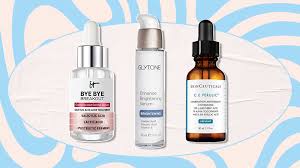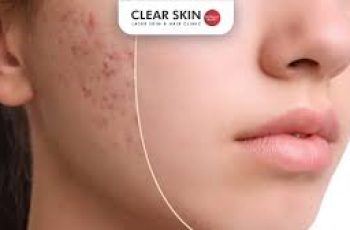
What Is The Best Serum For Ageing Skin?
It’s funny to think about a time before serums came along, it makes you wonder how we ever had a skincare routine without at least one type usually packed with potent ingredients.
But which of the hundreds available are best for ageing skin? It can be a tricky task trying to find one, but we are here to help you!
How do I choose a face serum?
Serums jobs are known for making their way further down into the lower layers of the skin, past the epidermis and able to target and treat skin concerns,
such as skin pigmentation, blemishes and ageing making it the perfect skincare product to use if you are finding those concerns need treating and your existing routine just isn’t cutting it!
The best way to choose a face serum is to firstly take into consideration your skin type and which results you would want to see after using this new serum on a daily basis.
There are a few potent skin ingredients you will find in high performing serums but the main ones to look out for that will help combat the signs of ageing are the following:
Retinol – Retinoids are able to counteract the many signs of ageing you may be experiencing, such as fine lines and wrinkles, uneven texture and lose of collagen and elasticity to the face.
This ingredient is extremely potent and needs to be introduced to the skin in the correct way to avoid any irritation or skin reactions.
Vitamin C – As the skin begins to age the skin cell turn over process begins to slow down leaving the complexion looking dull, grey and lacklustre.
By adding a serum containing vitamin C you will boost the vibrancy of the face and give your skin back it’s youthful glow.
Hyaluronic acid – Immensely hydrating to the skin, hyaluronic acid will make the face look super plumped and full of bounce with fine lines ironed out and left with an all-over smoother appearance.
Lactic acid – This AHA is perfect for skin that is more sensitive and is able to slough away any dead skin cells that can build-up on the skin causing it to look older than it actually is without any skin reactions.
These are some of the highest preforming ingredients to look out for when searching for an anti-ageing serum.
If you are introducing a completely new ingredient to your skin it is always best to perform a patch test for 24 hours before applying the product to the entire face to avoid any unwanted skin reactions.
What age do I start using vitamin C serum?
The key to anti-ageing is prevention so adding a vitamin C serum into your routine from the ages of 25 and onwards would set you on the right path for younger-looking skin.
Vitamin C can be known to cause some skin irritation, especially when exposed to UV rays.
This can be prevented by using a daily SPF of 30 and above, apply a 50p amount all over the skin before applying any makeup every day you plan to leave the house, even on days when it is overcast and raining as UVA rays are constantly present.
Do I need both serum and moisturiser?
Moisturisers and serums work on different layers of the skin and normally provide a slightly different benefit to the skin.
Serums are able to work their way further down into the skin and target areas that creams aren’t able to, they can correct any skin problems deep under the surface without you needing to give them a second thought.
The positive of using moisturisers is they are able to balance and restore the skin’s protective barrier giving the face a protective coat with the ability of fighting off any environmental aggressors, such as pollution, bacteria, debris and other free radicals.
Both of these products work wonders for the skin, so in regards to saying which is best, I would personally have to say both
However, if your budget only allows you one it is always best to invest in your serums as the active ingredients are more powerful resulting in skin improvement that is considerably quicker than using moisturiser.
Which is better for wrinkles retinol or hyaluronic acid?
For an all-rounder of combating any signs of ageing, I am always inclined to suggest using retinol.
If you are finding that there are more concerns you are wanting to target, such as loss of elasticity or firmness to the skin than retinol would be the best solution.
By using it responsibly after doing the correct amount of research for this product you will be able to see results in roughly 6-8 weeks.
If you are wanting a more instant result, hyaluronic acid is extremely hydrating to the skin and can provide immediate results of a smoothed out, youthful complexion.
This is also due to that fact that dehydrated skin is often mistaken for ageing skin and any fine lines that become quite visible are plumped out after the application of a serum packed full of hyaluronic acid.
Both of these skin changing ingredients are extremely beneficial for the skin and can, in fact, be used together without it causing any reactions or irritations.
Try using a hyaluronic acid during the day, as those instant results shouldn’t be wasted whilst you’re sleeping.
Keeping retinol for your evening routine, which will keep this powerful ingredient performing at its best without any exposure to UV rays diminishing any of its potency.
You will reap the rewards of these two powerhouse products without overloading the skin. It’s a win-win situation and your skin will thank you for it!
Should I use a face serum every day?
Absolutely! Face serums are extraordinary for the skin and should be applied every day, or evening, depending on which active ingredients are in the formulas.
There is nothing stopping you from using a variety of different serums depending on what your skin is telling you it needs throughout the day.
One point to remember is that if you are not cleansing your skin every day than the most expensive serum in the world will not be able to deliver the results you are longing for.
Ensure your skin is cleansed and make-up free removing the layer of dead skin cells, debris and foundation before applying your serum allowing it to work the way it was formulated to.
You can also mix up which serums you use day to day depending on what your skin is lacking or what you feel like it is needing to give it the best appearance and feeling comfortable.
There you have a run-down of the best serums for ageing skin! Ageing can affect the skin in so many ways it is a godsend to think of the variety of active ingredients found in good quality serums.
You may even find people asking you what your secret is, but it’s totally up to you what you decide to tell them!


